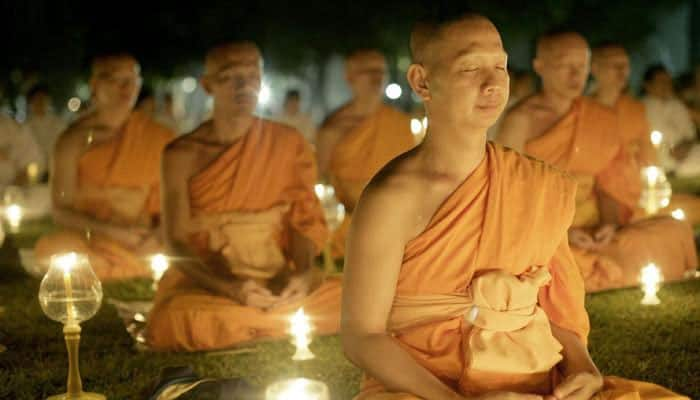Zen Buddhism is a mixture of Indian Mahayana Buddhism and Taoism. It began in China, spread to Korea and Japan, and became very popular in the West from the mid 20th century. The essence of Zen is attempting to understand the meaning of life directly, without being misled by logical thought or language. Zen techniques are compatible with other faiths and are often used, for example, by Christians seeking a mystical understanding of their faith. Zen requires an intense discipline which, when practiced properly, results in total spontaneity and ultimate freedom.
‘Zen’ is the way the Chinese word Ch’an is pronounced in Japan. ‘Ch’an’ is the Chinese pronunciation of the Sanskrit word Dhyana, which means meditation.
Christmas Humphreys, one of the leading pioneers in the history of Buddhism in Britain, stated that “Zen is a subject extremely easy to misunderstand.” Zen Buddhism is a practice that needs to be experienced, not a concept that you can intellectualize or understand with your brain. Zen does not depend on words – it has to be experienced in order to ‘understand’.
Zen sends us looking inside us for enlightenment. There’s no need to search outside ourselves for the answers; we can find the answers in the same place that we found the questions. The first step is to control our minds through meditation and other techniques that involve mind and body; to give up logical thinking.

Clues to the meaning of Zen (From BBC Website)
Because Zen is so hard to explain here are some quotations that may help you get an idea of it:
- The essence of Zen Buddhism is achieving enlightenment by seeing one’s original mind (or original nature) directly; without the intervention of the intellect.
- Zen is big on intuitive understanding, on just ‘getting it’, and not so hot on philosophising.
- Zen is concerned with what actually is rather than what we think or feel about what is.
- Zen is concerned with things as they are, without trying to interpret them.
- Zen points to something before thinking, before all your ideas.
- The key to Buddhahood in Zen is simply self-knowledge.
- To be a human being is to be a Buddha. Buddha nature is just another name for human nature – true human nature.
- Zen is simply to be completely alive.
- Zen is short for Zen Buddhism. It is sometimes called a religion and sometimes called a philosophy. Choose whichever term you prefer; it simply doesn’t matter.
- Zen is not a philosophy or a religion.
- Zen tries to free the mind from the slavery of words and the constriction of logic.
- Zen in its essence is the art of seeing into the nature of one’s own being, and it points the way from bondage to freedom.
- Zen is meditation.
My photographic Ideas from this
My initial ideas for the exploration of Zen Buddhism was as a result of a previous artist study i have completed on Hiroshi Sugimoto. He is a japanese artist where zen buddhism plays a significant role in his culture. Through his work there is this sense of spirituality, by seeing beauty in everything and the ideas of Zen Buddhism is also portrayed through his work. After having explored it more, i want to try and free the mind from the logical way of thinking about a landscape through my images. I want to try and convey a sense of beauty and importance in every aspect of what I am photographing. This links to the study of Monets Hay Stacks which show the importance of Hay Stacks in agriculture despite usually people being unconcerned with some Hay Stacks. Despite the absence of any real definition of Zen Buddhism i feel as if i can contribute to the explanation of it through my photographic responses that will have a focus on freedom, beauty and importance in everything that will help to relax and disconnect the mind from any logical thinking.
